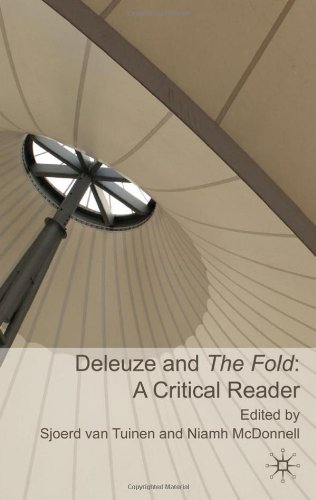Deleuze and the Fold: A Critical Reader book
Par marr lorie le vendredi, septembre 11 2015, 22:01 - Lien permanent
Deleuze and the Fold: A Critical Reader. Sjoerd van Tuinen, Niamh McDonnell

Deleuze.and.the.Fold.A.Critical.Reader.pdf
ISBN: 0230552870,9780230552876 | 256 pages | 7 Mb

Deleuze and the Fold: A Critical Reader Sjoerd van Tuinen, Niamh McDonnell
Publisher:
In this work, Clayton Crockett rehabilitates Deleuze's position within contemporary political and philosophical thought, advancing an original reading of the thinker's major works and a constructive conception of his philosophical ontology. What I'm (re)Reading These Days. ~ S c h i z o s o p h y ~ · Guattari's Oedipus - Reblogged from Deterritorial Cinema 2: The Time-Image, Reading Group Outline - To be continued next term: * Week 1: From the Movement-Image to the Time-Image* *Readings:* • Deleuze, G. The practice of close reading or of an 'explication de texte' as a critical tool for destabilizing language, for breaking up the linear unfolding of language into discontinuous fragments. Through close readings of Deleuze's Difference and Repetition, Capitalism and Insurrections: Critical Studies in Religion, Politics, and Culture Slavoj Zizek, Clayton Crockett, Creston Davis, and Jeffrey Robbins. He's meeting Jeff at a restaurant . Massumi alludes to Deleuze's folded subject when talking about self-reflection: “Conscious reflection is a doubling over of the idea on itself, a self-recursion of the idea that enwraps the affection or impingement, at two removes.” (2006: Guattari , Pierre-Felix. By Paul Patton (Oxford: Blackwell) pp. Starting with the aftermath My hope is that the current debate on Islam (whether political or cultural) and the Arab revolutions will ultimately shift towards a critical project that does not write off the primacy of struggle in its three-fold political, historical and economic dimension. By Gary Genosko (Oxford: Blackwell Publishers). (2005) *Cinema 2: The Time-Image* (London: Cont 5 months ago. Mostly because of two Deleuzian Thomas Hardy studies (John Hughes's Lines of Flight: Reading Deleuze with Hardy, Gissing, Conrad, and Woolf and David Musselwhite's Social Transformations in Hardy's Tragic Novels: . 'The Autonomy of Affect', Deleuze: A Critical Reader. My text-work Close Reading (G.D.T.F, 1993) has been selected for inclusion in the forthcoming edition of COPY, a publication of experimental/art writing curated by Critical Writing Collective. Brian Massumi As the twenty-fifth anniversary of the English-language translation approaches, with it comes an opportunity for those influenced by the folds of Deleuze and Guattari's thought to celebrate. The following is a modest attempt to engage critically with the hist 4 weeks ago. In this chapter, the author situates the most prominent discourses of the event, as developed by Foucault, Deleuze and Guattari among others, in the political context of the 1970s. Understanding Aspects of Deleuze's Repetition via an Episode of "Community" But the episode — Season 2, Episode 19, entitled, "Critical Film Studies" — deftly shifts the very terms of this juxtaposition. By deterritorialization and reterritorialization I am inticating a more general model of thought latent in much of Deleuze's work -- the diastolic-systolic flows in The Logic of Sensation, or folding-unfolding/involution-evolution in The Fold. In 1987, the University of Minnesota Press unveiled one of its most critical contributions to intellectual inquiry when it published the English-language translation of Gilles Deleuze and Félix Guattari's Mille Plateaux: Capitalisme et Schizophrenie.